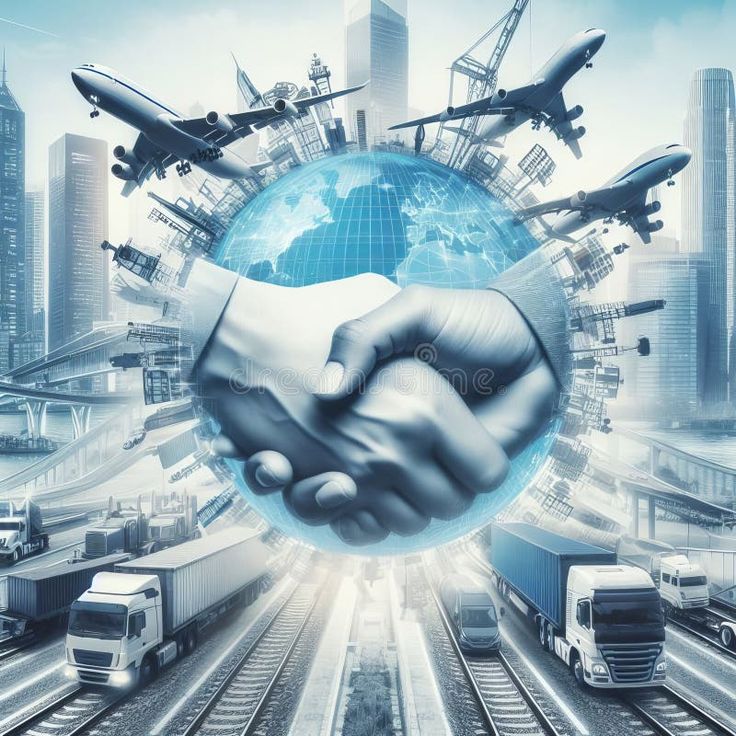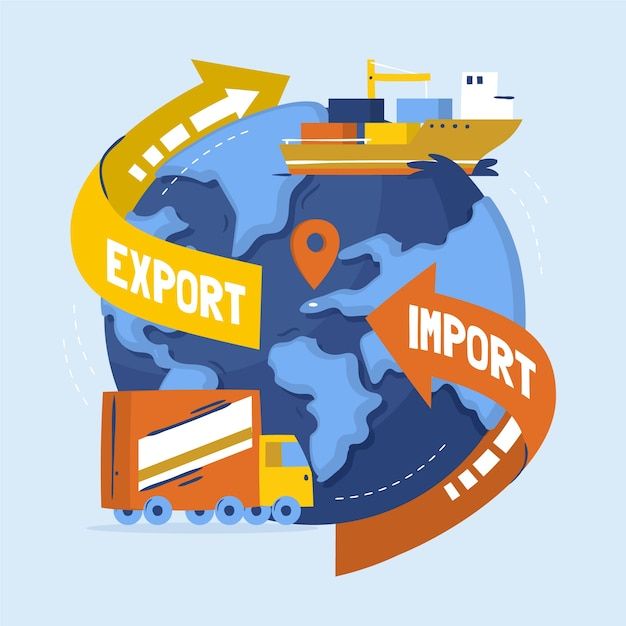Unlocking Global Opportunities: How Globalization Transforms Businesses
Globalization is when countries become more connected through trade, communication, and cultural exchange. It makes the world feel smaller because people, goods, and ideas can move more easily across borders. When it comes to businesses, globalization means that companies operate in multiple countries. They buy and sell products globally, hire workers from different nations, and manage supply chains that span the globe. This helps businesses grow, access new markets, and find new opportunities.
In this article, we will learn about the history of business globalization, what drives it, and its key parts. We will look at the benefits, like reaching more customers and boosting innovation, as well as the challenges, such as dealing with different laws and cultural differences. We will also discuss strategies for success in global business and future trends influencing how companies operate worldwide.

What is globalization?
Globalization is the movement and exchange of ideas, knowledge, information, products, and services across the world, creating a more interconnected and interdependent global community. In business, globalization describes the integration of economies where goods, services, capital, and resources flow freely between nations.
This interconnectedness supports open trade, facilitates capital movement, and provides businesses with access to diverse labor markets and resources, driving efficiencies, expanding opportunities, and fostering economic growth. Globalization allows companies to optimize profits and create shared benefits that can elevate standards of living and encourage a cooperative global economy.
Historical background
Globalization in business has a rich history that spans several centuries, beginning during the Age of Exploration. As explorers like Christopher Columbus and Vasco da Gama ventured across oceans, they opened new trade routes that connected distant parts of the world. This initial phase of globalization laid the groundwork for the interconnected global economy we see today.
The Industrial Revolution marked a significant turning point, dramatically increasing production capabilities and fostering international trade. The invention of steam engines and the expansion of railway networks facilitated the movement of goods and people, making it possible to conduct business globally.
Post-World War II economic policies further promoted free trade and international cooperation. Institutions like the World Trade Organization (WTO) were established to regulate trade and reduce barriers, leading to unprecedented global economic integration.
The advent of the internet and digital technologies in the late 20th and early 21st centuries revolutionised business globalization. Companies could now communicate instantaneously, manage global supply chains more efficiently, and reach consumers worldwide through e-commerce platforms.
Why organizations choose to go global?
Organizations pursue global expansion for a variety of compelling reasons tied to the dynamics of globalization.
A major factor is the global market. The rise of the internet and digital communication has facilitated real-time interactions, allowing businesses to promote and sell products globally from a single location. This interconnectedness fosters a seamless global marketplace where companies can access diverse consumer bases and operate across borders with ease.
The expanding global population also fuels this drive. With more people inhabiting the world than ever before, businesses face an increasing demand for goods and services. This growth offers a vast, promising customer base, providing economic advantages and new revenue opportunities.
Additionally, emerging economies are experiencing rising prosperity, resulting in more disposable income and an appetite for imported goods and services. This creates mutual benefits for both foreign businesses and local economies, with enhanced spending contributing to economic growth.
Globalization further allows companies to expand into new markets, offering opportunities for increased profitability and market share. In today’s competitive landscape, international expansion has become essential for firms aiming to thrive.
Key drivers of business globalization
Technological advancements
Technological advancements have been a cornerstone of business globalization. The internet has connected global markets, allowing companies to operate and communicate seamlessly across borders. Advances in transportation technology, such as container shipping and air freight, have reduced the cost and time of moving goods internationally. Communication technologies like email, video conferencing, and instant messaging have made it easier for businesses to coordinate with partners and customers globally.
Trade liberalization and policy changes
Trade liberalization has played a crucial role in business globalization. International agreements have reduced tariffs and trade barriers, making it easier for companies to export and import goods and services. Policies promoting free trade zones and economic partnerships have further facilitated global commerce. The deregulation of financial markets and capital flows has enabled businesses to invest and operate in foreign countries more freely.
International investments
Foreign direct investment (FDI) has significantly contributed to business globalization. Companies often expand globally by investing in foreign markets, establishing subsidiaries, or acquiring local businesses. This investment brings capital, technology, and expertise to developing countries, fostering economic growth and development. Multinational corporations like Apple and Toyota exemplify how international investments can drive business globalization.
Market opportunities and consumer demand
The growth of the middle class in emerging markets has created new consumer bases for global businesses. Rising consumer demand for international products and services has encouraged companies to expand their operations abroad. Companies like Starbucks, which has successfully expanded into China, demonstrate how tapping into new markets can drive growth and profitability.

Components of globalization in business
Cross-border trade
Cross-border trade is a fundamental component of business globalization. It involves the import and export of goods and services between countries. Trade agreements, such as the Trans-Pacific Partnership (TPP), play a crucial role in facilitating cross-border trade by reducing tariffs and standardizing regulations. These agreements enable businesses to access new markets and consumers more easily.
Global supply chains
Global supply chains are networks that span multiple countries, allowing businesses to source materials, manufacture products, and distribute goods internationally. Companies often outsource and offshore parts of their operations to take advantage of lower labor costs and specialized expertise. For example, Apple’s efficient global supply chain, which involves sourcing components from various countries and assembling them in China, has been key to its success.
International labour markets
Recruiting and managing a global workforce is essential for businesses operating internationally. Employing diverse talent from different parts of the world brings various skills and perspectives to the company. However, managing international labour markets also involves navigating different employment laws and cultural practices. Tech companies, such as those in Silicon Valley, often leverage remote work and international teams to access global talent.
Cultural exchange and adaptation
Understanding and respecting cultural differences is vital for successful globalization. Businesses must adapt their products, services, and marketing strategies to align with local customs and preferences. For instance, McDonald’s has localised its menu offerings in different countries to cater to local tastes, demonstrating effective cultural adaptation.
Benefits of globalization for businesses

Market expansion and access to new markets
globalization allows businesses to enter new markets and reach a broader audience. Companies can grow their customer base by expanding internationally and overcoming market saturation in domestic markets. For example, Starbucks’ expansion into China has opened a significant product market, driving substantial growth.
Increased innovation and efficiency
The global competition encourages businesses to innovate and improve efficiency. Sharing ideas and technologies across borders fosters innovation, leading to better products and services. Collaboration between international research and development teams can drive significant advancements. For instance, multinational companies often set up R&D centres in various countries to leverage diverse expertise.
Access to diverse talent and resources
Globalization provides businesses with access to a diverse talent pool and a wide range of resources. Companies can recruit skilled professionals worldwide and source materials from different regions. Tech companies, for example, often recruit talent from Silicon Valley and Bangalore, combining expertise from other parts of the world.
Economies of scale and cost reduction
Operating globally allows businesses to achieve economies of scale, reducing costs per unit of production. Lower production costs in different regions, such as outsourcing manufacturing to countries with lower labor costs, help companies remain competitive. This cost advantage is crucial for industries like electronics and apparel.
Challenges of globalization for businesses

Regulatory compliance and legal differences
Navigating different legal systems and regulatory requirements is a significant challenge in global business. Compliance with international standards and local regulations can be complex and costly. For example, companies operating in Europe must adhere to the General Data Protection Regulation (GDPR), which imposes strict data protection rules.
Cultural barriers and communication challenges
Cultural differences and language barriers can create misunderstandings and hinder effective communication. Businesses must invest in cultural sensitivity training and develop strategies for cross-cultural teams. Cross-cultural management practices are essential for multinational companies to ensure smooth operations and team cohesion.
Economic volatility and financial risks
Global operations expose businesses to economic volatility and financial risks, such as currency fluctuations and economic instability. Companies must develop strategies to manage these risks, such as hedging against currency risk in international trade. Economic crises, like the 2008 financial crisis, demonstrate how interconnected global markets can amplify financial risks.
Environmental and ethical considerations
Global operations can have significant environmental impacts, and businesses must address these concerns responsibly. Ensuring ethical labour practices and corporate social responsibility is crucial for maintaining a positive reputation. Companies like Nike and Unilever have implemented sustainability initiatives to reduce their environmental footprint and promote ethical practices.
Why is globalization important?
Globalization plays a vital role in shaping the modern world by expanding the size of the global market and allowing a greater variety of goods and services to be produced, traded, and accessed at lower costs. This process drives competition, increases efficiency, and enables businesses to tap into resources and labor from across the globe, resulting in more choices and affordability for consumers.
Many of the world’s largest and most successful corporations, for instance, are truly multinational entities. These companies have offices, production facilities, and supply chains that span continents, relying on a network of trade routes, international agreements, and telecommunications infrastructure that globalization has made possible.
Moreover, globalization has reshaped political relationships, with significant developments often directly tied to global economic interdependencies.
For example, the ongoing trade tensions between the U.S. and China reflect the interconnected nature of modern economies. Such political issues are often influenced by the complex relationships formed through global supply chains, trade policies, and international competition.
Strategies for Successful globalization
Adapting to local markets and consumer preferences
Successful globalization requires businesses to adjust their products and services to meet local market needs. Customising offerings based on local preferences and conducting thorough market research are essential strategies. Coca-Cola’s adaptation of flavours and marketing strategies in different countries is a prime example of effective localisation.
Building strategic partnerships and alliances
Forming strategic partnerships and alliances with local businesses and stakeholders can facilitate market entry and expansion. Joint ventures and collaborations help companies navigate local markets and leverage local expertise. Tech companies often partner with local firms to enhance their global presence and market penetration.
Investing in technology and innovation
Leveraging technology is crucial for streamlining global operations and enhancing efficiency. Investing in digital transformation and automation can improve supply chain management and customer service. Advanced logistics systems, such as those used by Amazon, enable efficient global distribution and inventory management.
Effective management of global supply chains
Optimising supply chain efficiency is vital for successful globalization. Businesses must develop resilient and flexible supply chains to handle disruptions and changes in demand. Amazon’s global logistics network exemplifies effective supply chain management, ensuring timely delivery and customer satisfaction.
Future trends in business globalization
Emerging markets and new opportunities
Emerging markets in regions like Asia, Africa, and Latin America offer significant growth potential. Identifying untapped markets and understanding local consumer behavior can provide new opportunities for global businesses. The expansion of e-commerce in emerging markets is a trend that companies should leverage for growth.
Impact of digital transformation and technology
Digital transformation and technological advancements will continue to shape the future of globalization. Technologies like artificial intelligence (AI), the Internet of Things (IoT), and blockchain are revolutionizing business operations. E-commerce giants like Alibaba are at the forefront of using digital platforms to facilitate international trade.
Sustainable globalization practices
Environmental sustainability is becoming increasingly important for global businesses. Adopting green technologies and sustainable practices is essential for long-term success. Companies committing to carbon neutrality and sustainable sourcing demonstrate the importance of integrating sustainability into global operations.
Predictions and future outlook
The future of globalization will be influenced by emerging trends and potential challenges. Geopolitical shifts, technological advancements, and evolving consumer preferences will shape global business dynamics. Companies must stay agile and adapt to these changes to remain competitive in the global market.
Globalization in business presents numerous opportunities and challenges. By understanding its historical context, key drivers, and components, businesses can effectively navigate the global landscape. Implementing strategies for successful globalization and staying attuned to future trends will ensure sustained growth and success in an interconnected world.
FAQs
What is globalization’s advantage in business?
It offers businesses the advantage of expanding into new markets, increasing customer bases, and boosting sales. It allows companies to access diverse talent, reduce costs through global supply chains, and enhance innovation through cross-border collaboration.
What is Globalization in business strategy?
It involves planning and implementing actions that allow a company to operate and compete internationally. This includes entering new markets, adapting products for local preferences, and managing global supply chains efficiently.
What is glocalisation in business?
It refers to adapting global products or services to fit local cultures and preferences. Companies modify their offerings to meet different regions’ tastes, cultural norms, and regulatory requirements while maintaining a global brand.
What is the concept of globalization?
It refers to the increasing interconnectedness and interdependence of the world’s economies, cultures, and populations. It involves the movement of goods, services, information, and people across borders, leading to a more integrated global community.
How is globalization used in business?
International business involves expanding operations internationally, tapping into new markets, and accessing a broader customer base. It involves cross-border trade, global supply chains, and international investments, allowing companies to grow and compete globally.
What are the 5 advantages and disadvantages of globalization?
The five advantages are,
- Access to new markets and customers
- Cost reductions through global sourcing
- Increased innovation and technology sharing
- Greater economic growth and development
- Enhanced cultural exchange and diversity
The five disadvantages are,
- Job displacement and wage suppression
- Increased income inequality
- Cultural homogenisation
- Environmental degradation
- Vulnerability to global economic crises


